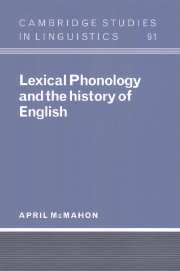Book contents
- Frontmatter
- Contents
- Acknowledgements
- 1 The rôle of history
- 2 Constraining the model: current controversies in Lexical Phonology
- 3 Applying the constraints: the Modern English Vowel Shift Rule
- 4 Synchrony, diachrony and Lexical Phonology: the Scottish Vowel Length Rule
- 5 Dialect differentiation in Lexical Phonology: the unwelcome effects of underspecification
- 6 English /r/
- Bibliography
- Index
5 - Dialect differentiation in Lexical Phonology: the unwelcome effects of underspecification
Published online by Cambridge University Press: 22 September 2009
- Frontmatter
- Contents
- Acknowledgements
- 1 The rôle of history
- 2 Constraining the model: current controversies in Lexical Phonology
- 3 Applying the constraints: the Modern English Vowel Shift Rule
- 4 Synchrony, diachrony and Lexical Phonology: the Scottish Vowel Length Rule
- 5 Dialect differentiation in Lexical Phonology: the unwelcome effects of underspecification
- 6 English /r/
- Bibliography
- Index
Summary
Introduction
The investigation of the Scottish Vowel Length Rule in the last chapter raises important issues for the modelling of sound change in Lexical Phonology, a topic to which we shall return in chapter 6. However, it also relates very directly to a synchronic question we have touched on several times already, namely the degree to which different dialects of the same language can vary. Of course, SVLR is a process specific to Scottish varieties; this kind of variation in the form, order and inventory of phonological rules is already familiar from Standard Generative Phonology. But we have departed from the SGP line in also allowing dialectal divergence in the underlying representations: for instance, various vowel oppositions (such as the RP and GenAm Sam ~ psalm and pull ~ pool pairs) are simply neutralised in toto in Scots and SSE; and we saw in chapter 3 that the father vowel should be analysed as underlyingly front in some varieties of English, and back in others.
We might regard these minor, scattered examples as still compatible with a generally panlectal approach to phonology; in 5.5.2 below, however, I shall propose a far more general and more radical underlying dialectal difference, involving the dichotomising feature(s) which establish the structure of the whole vowel system. I shall argue that in some varieties of English only [± tense] is underlyingly relevant; in others, only length; and in still others, both.
- Type
- Chapter
- Information
- Lexical Phonology and the History of English , pp. 205 - 229Publisher: Cambridge University PressPrint publication year: 2000



